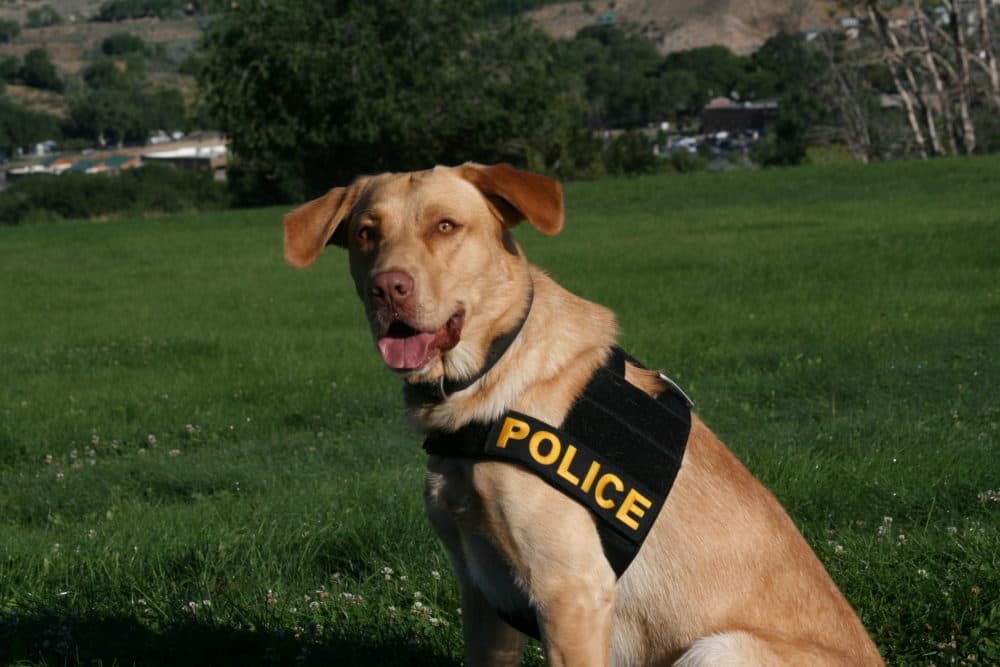Advertisement
Legalization Is Putting Some Pot-Sniffing Police Dogs Out Of A Job

Much has been said about the economic benefits of legalizing marijuana — Colorado has brought in $1.5 billion in state revenue since 2012. But one job that's in jeopardy because of legalized recreational cannabis? The marijuana-sniffing dog.
Once a dog has been trained to sniff marijuana, it can't be untrained. As The Denver Post reports:
That's a problem in Colorado, because K-9 handlers can't tell whether the dog is alerting them to the presence of an illegal substance or legal amounts of weed, and police need probable cause that a crime has been committed before searching further.
That problem emerged in one case in Moffat County, Colorado, where a police dog named Kilo alerted handlers to search a vehicle where meth was found. Judges later ruled the search illegal, because Kilo might have alerted officers to the truck because he smelled legal marijuana instead of meth.
Here & Now's Robin Young learns more from Garrett Duncan, a police officer in Rifle, Colorado, where he's also the handler and owner of the department's drug-sniffing dog, a yellow lab named Tulo, who's set to retire this month.
"He's 10 1/2, he's been with the department since 2010. The question that was brought up when we were deciding on how to replace Tulo was whether we wanted to train those dogs on marijuana still," Duncan says. "Actually, we made the decision not to, because it's not practical to have a marijuana-sniffing dog on the road anymore."
Interview Highlights
On the Moffat County case that was thrown out by a three-judge panel
"The reasoning is ... because people do, with marijuana being legal, have a reasonable expectation of privacy for that particular odor. When we talk about dogs and the way they work, the dogs are locating an odor that they're trained to detect, such as marijuana in this case. The case up in Moffat County, I don't believe that they actually found any marijuana. The courts in and of themselves brought up the fact that, 'Well wait, this dog is trained in marijuana, so how do we know he didn't indicate on ... some marijuana,' and then that brought into question the dogs that are currently trained on marijuana.
"We have to have a warrant before we perform a search, and over the years, there's been lots of exceptions added to that particular requirement. The United States Supreme Court has ruled that when officers have probable cause to believe that there's illegal, and in this case ... substances such as drugs inside a vehicle, if we've built up the probable cause, we can search that, because there is so much of a chance of the vehicle being moved and evidence being lost."
Advertisement
On the difficulty of not being able to retrain dogs on what — and what not — to smell for
"It makes our job a little more difficult. Before, at least in the state of Colorado how it is now with the recent ruling, they're wanting dogs that are trained in marijuana — before we deploy them — they want us to have more reasonable suspicion that there might be something other than marijuana there."
On the difficulty of buying and training these dogs
"We actually got Tulo because of me. I went out, I purchased him as a puppy, I got him trained and the department was able to pay a few dollars so that we could get certified, and now that we're looking to replace him, we don't just have an extra ten, fifteen thousand dollars. Dogs ... without any real training can be five to ten thousand dollars. On top, you have to add on the time for training and getting certified, and that can add on another expense that a lot of departments, in Rifle, we don't have that kind of money.
"We actually had a local 4-H kid named Carter Faulk, he came to us and offered to help us start raising some funds so that we could purchase a new dog. So Carter was instrumental in helping get us two new dogs that will be certified in January to take Tulo's place."
On Tulo's biggest bust over the course of his police career
"Drug-wise, his biggest was — before marijuana was legal — eight pounds of marijuana. The other one was a kilo of methamphetamine."
Karyn Miller-Medzon produced and edited this interview for broadcast. Jack Mitchell adapted it for the web.
This segment aired on January 3, 2019.
